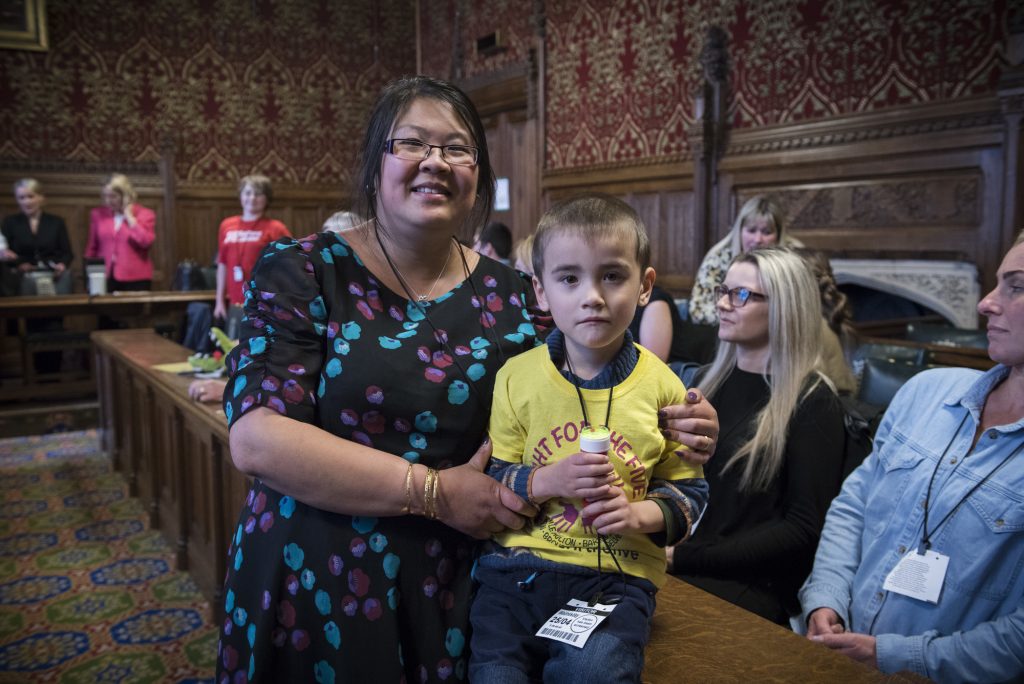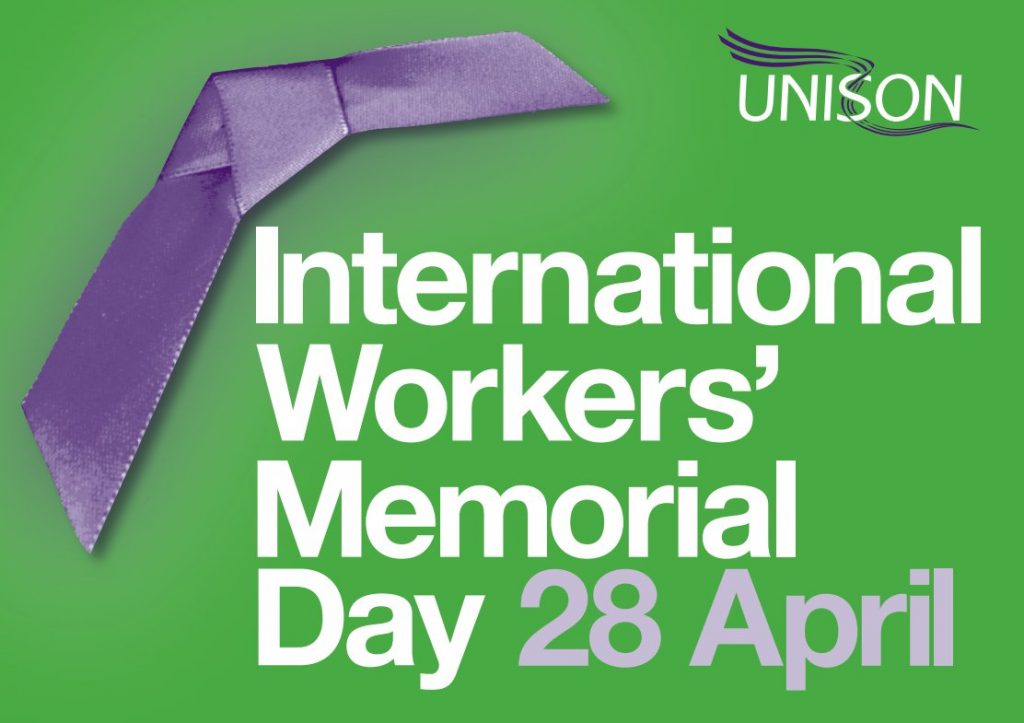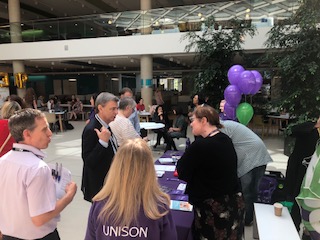Ryan, Daniel, Jacob, Sophia and Zach were probably some of the youngest campaigners at the Houses of Parliament last week. They were there (with their mums) to talk to MPs about keeping their nurseries open.
The group of children, parents, UNISON organisers and staff from the nursery began the day at 5am, with a six-hour coach journey from Salford to London. When they arrived they were focused, placards in hand and ready for action
 Zoe Ireland and her daughter Alice queue up to enter the Houses of Parliament
Zoe Ireland and her daughter Alice queue up to enter the Houses of Parliament
They were there because five council-run nurseries in Salford could be closed down. Two months ago the parents had received a letter saying the council would be consulting on the future of the nurseries, even though all five are rated outstanding by Ofsted.
So, why is the council considering closing the nurseries? Along with fees paid by parents, nurseries are funded by councils, using a grant from central government. Up until recently councils have been able to decide how much funding they give to each nursery provider, but the government recently changed the rules to mean that councils no longer have that discretion.
The problem is, nurseries that are maintained by local councils tend to cost more to run than private nurseries. There are good reasons for this – they are usually in places with high deprivation, where parents are less likely to be able to afford to pay, and because as public sector organisations the staff have better conditions such as pensions, sick pay, and annual leave pay, which all adds up.
After the shocking announcement on the nurseries future, parents and UNISON members moved quickly, setting up a campaigning group that organised meetings and a march through Salford. They managed to get the council, who have been sympathetic to the cause, to commit to funding the nurseries until 2019, but still want the reassurance that their beloved nurseries won’t close at all.
Zoe Ireland is a mother of two girls, one of whom used to attend a Salford nursery and another who still does. She says the staff in Salford go above and beyond what is expected, which she found especially helpful when she was a first-time mum. “They don’t just tick the boxes, they do all the other bits that you don’t see on paper. I could ask them anything and they’d give me an answer quicker than a health visitor. From nappy rash, to teething, sleepless nights, tantrums, the lot, they would help me.”
For Zoe’s daughter Alice, 7, the best thing about the nursery was “the way they treated us, they were nice”.
 Kelly Bentham with her children Jacob, Sophia and Zach
Kelly Bentham with her children Jacob, Sophia and Zach
Kelly Bentham is the mother of Sophia, who attends one of the nurseries, and Jacob and Zach, who both used to. She is passionate that the nurseries stay open, “They’re outstanding for a reason, and they need to keep within the council sector so they are kept as outstanding. My children have absolutely flourished; I can’t fault them.”
Once the group had arrived at Parliament and filed through security, they were joined in a grand room by several MPs, including Rebecca Long-Bailey, the MP for Salford and Eccles, who has been supporting the campaign to keep the nurseries open. Also in attendance were UNISON’s former President and now MP Eleanor Smith, Tracy Brabin MP who is Shadow Minister for Early Years (and previously of Coronation Street fame), Andrew Gwynne who is Shadow Secretary of State for Housing, Communities, and Local Government, and Paul Dennet, the Mayor of Salford.
Val Worrall is a member of staff at Broughton nursery. She kicked off the meeting by talking about the nursery she’s proud to work at. She told everyone about the important partnerships the nurseries have with the parents, children and other professionals in the community, and spoke about how dedicated her colleagues are. “Some of the staff I work with are third generation – they’re looking after children whose parents and grandparents they’ve looked after before.”

Holly Swindles with her son Jake
One of the parents to address the room was Holly Swindles, who held a wriggling ten-month old called Jake as she spoke. Holly explained that if Jake’s nursery closed she would have to consider giving up her career, a sentiment echoed by other mothers. The next nearest nursery to her home costs £18 extra per day, and wasn’t even rated outstanding. She pointed out that the government shouldn’t be de-incentivising work.
Holly explains that she had Jake on the waiting list for his nursery before he was even born, it’s reputation was that good. She was delighted that Jake got a place, but devastated when three days after he joined she received the letter about the potential closure, especially as Jake already loved the place. “They are like a family there, he absolutely loves them. He dives over to his key worker in the morning, he just wants me to clear off so he can have a good time.”

Maybo Chiu and her son Daniel
One of the things the nurseries in Salford excel at is looking after children with additional needs. Maybo Chiu’s son Daniel has recently been diagnosed with autism. He attends Little Hulton nursery, which is part of a Sure Start centre. “The nursery staff there have just been amazing with him. They’ve got the patience and the experience to deal with children with additional needs. Part of his autism means he has severe speech and language delays and he’s also got developmental delays, so just having the nursery there for him to go to is a real lifeline for me, and for Daniel in terms of his development, to get him ready for reception.”
The difference this has made to Maybo is clear; when she addresses the meeting her voice begins to crack as she talks about how grateful she is to the nursery staff, and it’s clear they’ve had a big impact on her life. Daniel, on the other hand, took the meeting in his stride.

Daniel surveys the meeting at Parliament
It emerged at the meeting that this is not only a problem in Salford. Nurseries are also under threat in Cambridge, Birmingham and Bradford, amongst other places.
UNISON believes that the government funding for the early years is inadequate to provide the high-quality services our children deserve.
The restrictions that the Department for Education has placed on local authorities through the new early years funding regulations are unfair on maintained nurseries and restrict the ability of authorities to fund high-quality nurseries.
Ben Thomas, UNISON’s national officer for education, said: “Nurseries like the outstanding nurseries in Salford with well qualified, high quality staff are what the government should be aspiring to for all nurseries, not destroying them with a penny pinching levelling down of funding rates.
“Maintained nurseries are providing the highest quality provision in some of the most disadvantaged areas of the country. They must be protected against cuts to their funding.”
After the meeting, at which MPs committed to supporting the cause in Salford, as well as supporting Sure Start centres and investing in early years, the campaigners headed over to the Department for Education. They had been hoping to talk to one of the ministers responsible for education, but as none had been willing to meet them they protested outside instead.

Campaigners outside the Department for Education
Steve North, branch secretary for Salford City UNISON, was disappointed that the minister for education did not meet with the group, but said they now have a meeting set up for May. “We’re really pleased with how the day went. It was fantastic to get so much support from our union, as well as Shadow Cabinet members like Andrew Gwynne and Tracy Brabin – and our own Salford MPs Rebecca Long Bailey and Barbara Keeley.
“We will keep fighting until our Salford nurseries are safe, and we’ll support any other campaigns fighting to protect vital early years services.”
Even after a long and tiring day, the young campaigners enthusiastically joined the lobby to save the nurseries they have clearly benefitted from. The question is, will the future children of Salford get to benefit from them too?
The article Save our nurseries: when the kids went to Westminster first appeared on the UNISON National site.
from RSSMix.com Mix ID 8239598 https://www.unison.org.uk/news/article/2018/04/save-nurseries-kids-went-westminster/
via IFTTT
source https://childrensplayareadesigns.tumblr.com/post/173455516617


